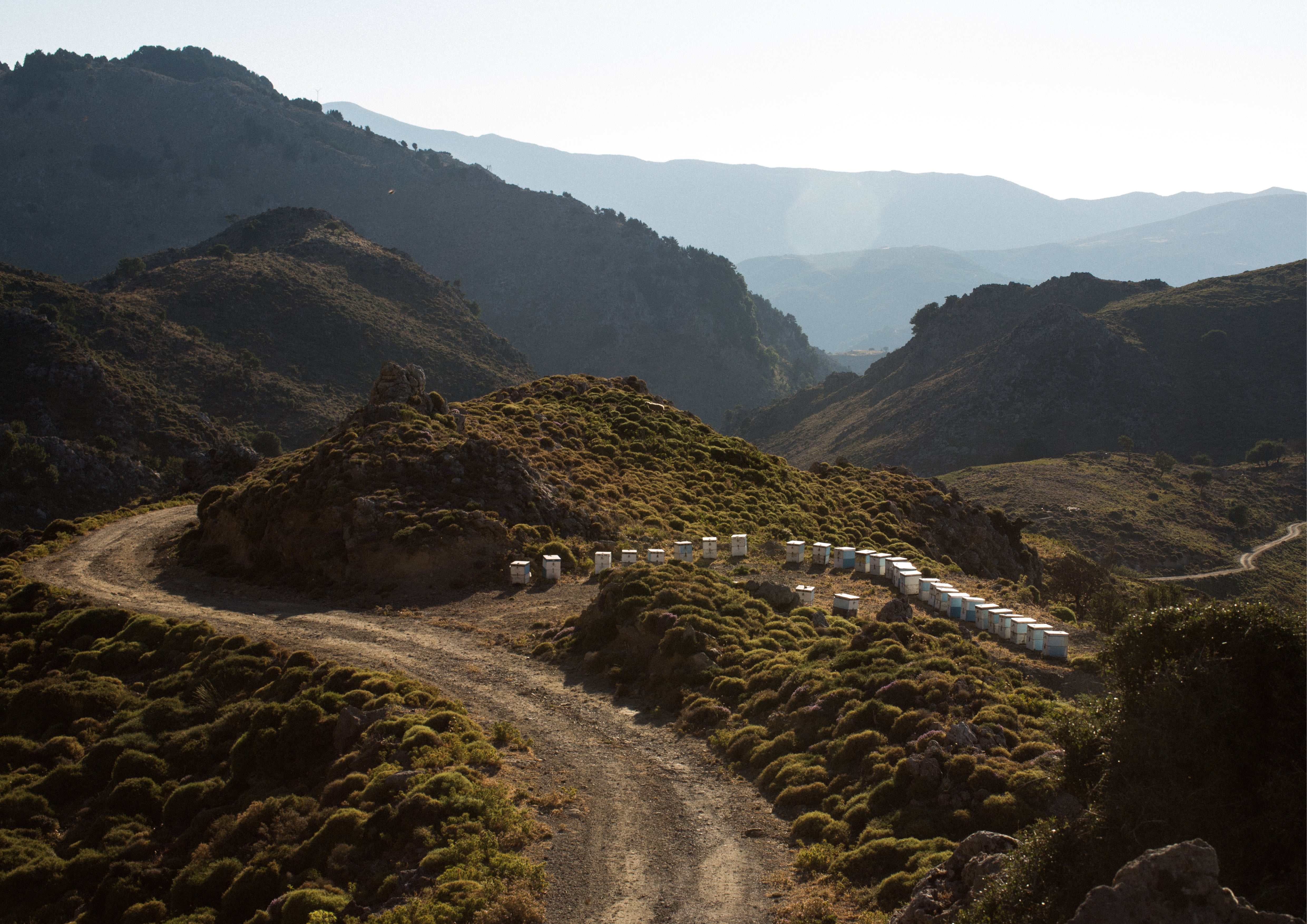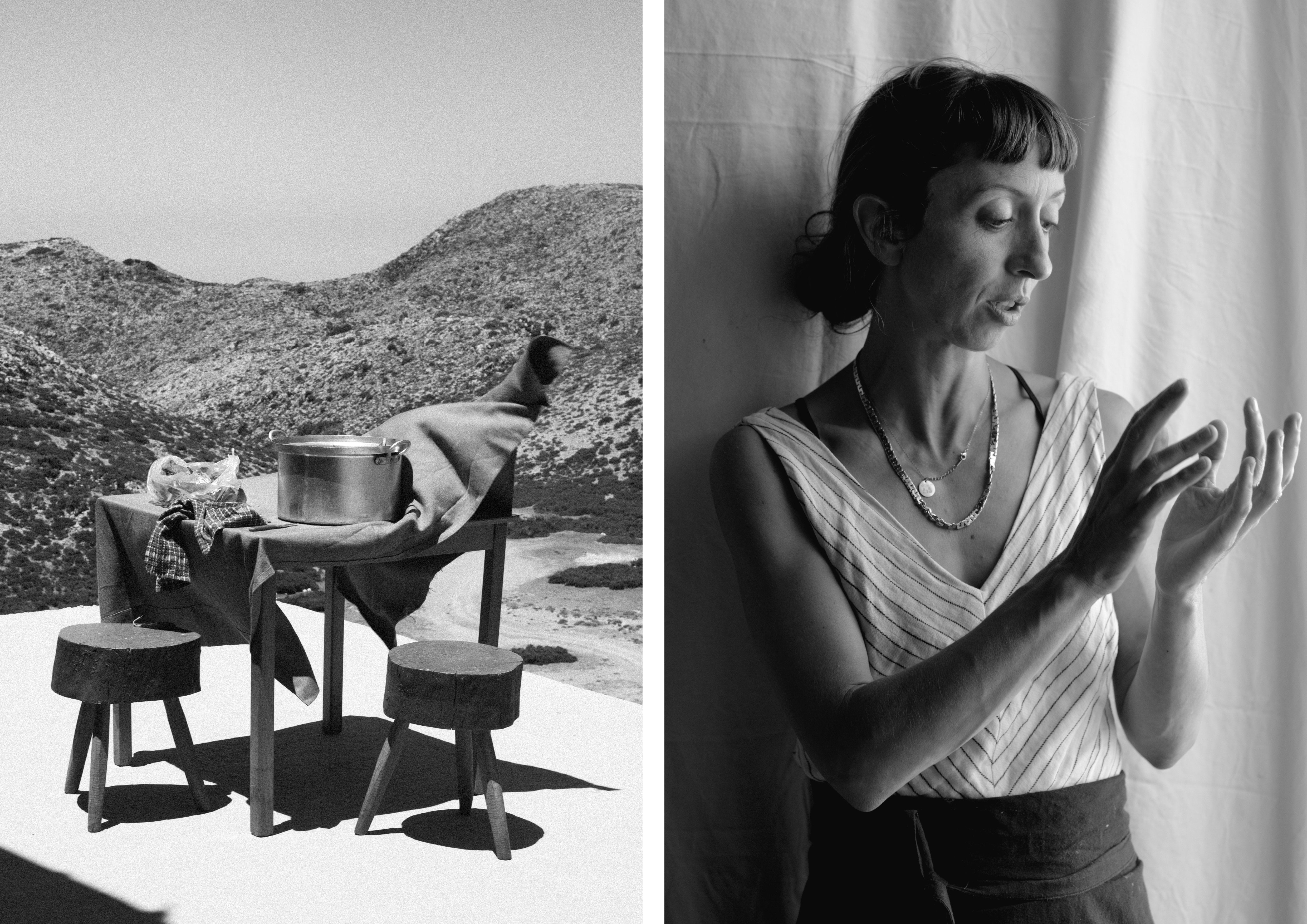
For TOAST Portraits, journalist Mina Holland and photographer Elena Heatherwick meet the people whose treasured TOAST pieces some archive, some new have stood the test of time. First up was Katy Brett, then Genevieve Dutton, Dawn Worsley, Kat Bazeley, Meg Brooks, Susan Hay and cook Rachel Roddy. Last summer, Elena travelled to Crete to photograph Aegean, a new recipe book by Marianna Leivaditaki. Below is her story.
Marianna Leivaditaki has working hands. They are paler than you might expect a Cretan fisherman's daughter's to be, but still, these hands are no stranger to hard work their sinews familiar with hooks and string, their callouses old friends to sharp knives.
The head chef at London's Morito, Hackney Road whose first book Aegean, a paean to the flavours of the Mediterranean, was published in July grew up in the Cretan town of Chania, in an environment of free, protected wildness. Her father caught fish by night, which, by day, became some of the food her mother served at the family restaurant in town.
There was always a lot of worry about the weather, says Marianna, explaining that her father, Lyssandros, still to this day fishes solo at night on a four and a half metre boat with no cover and no light; he puts the line out, then pulls it in by hand to reveal all manner of local fish: red or black bream, bass, sole, grouper. As a child, her father would come home in the morning, go to sleep, and when he awoke, ask his daughter to make him lunch consisting of the fish he hadn't been able to sell. Marianna was so little that she'd have to stand on a chair to cook, frying the fish in a deep pool of olive oil. Then we'd clean the bait, she says. Hundreds, sometimes thousands, of live prawns, limpets, or baby fish to prepare for the next night's work my little hands used to bleed.


The Leivaditaki children Marianna and her brother, Adonis worked, often until quite late into the night, which perhaps wouldn't be approved of now, but at the same time we had this amazing relationship with the sea we were so close to it, so aware of what it gave us, what it allowed us to eat every day, without even thinking of the cost, because my dad caught it, she says. When not working, she and Adonis would go missing for hours, their parents unaware of their whereabouts as they cavorted on their BMX bikes, climbing trees, swimming, buying ice creams, but always back in time to prep at the restaurant cleaning potatoes, peeling onions, washing fish and preparing octopus. We had a great sense of responsibility for what the family was doing, she says.
Leivaditaki has been living in the UK for several years, her connections to British producers, local suppliers, her staff and other restaurateurs create a singularly delicious network. Yet her link to the island of Crete and her hometown of Chania is still strong. She has brought its flavours to her work at Morito, and before that Moro, imbuing chef patrons' Sam and Sam Clark's Moorish (and moreish) food with Cretan character.
And there's evident closeness between Marianna and her family. In a photograph that stuns with its primary colours the blueness of the sea and sky, the brightness of a yellow sun, the vermillion of a dress Marianna wears she is slotted under her father's arm at sea, both of them grimacing in the strong light. You usually go on the boat in your worst clothes you don't want to ruin anything good with engine oil or fish water! But the red dress, a TOAST piece from several seasons ago, allowed the fisherman's daughter to look fabulous and work I managed to get on, off, and jump around the boat in it!


Marianna owns a few other TOAST pieces, a pair of grey woollen trousers (a London staple), a waffle, cotton top in mustard, a loose button-down shirt, all of which get better with time and can be worn in myriad contexts, she says. These are the kinds of clothes she always wears; I like the freedom they give a woman, giving her femininity without showing every single curve, she says, I otherwise live in my chef clothes, which are always over-sized, and I love that."
When Leivaditaki came to Britain, it wasn't to cook, but to study psychology. Aged 18, she enrolled at the University of Kent, and went on to do a Masters in forensics. Always having to fund herself, she variously worked shifts at Pizza Hut, an Alzheimer's care centre and, eventually, at a restaurant inside Canterbury's covered farmers' market. There, making jams and preserves on-site, she became interested in English produce, and the spark I already had inside me started to ignite again. She and her colleagues would save their tips for a monthly blow-out meal in London; their first visit to Moro opened her eyes to what British food could be. They were doing all these things that were really familiar from my past, making bread with a real wood oven, cooking meat on a charcoal grill I fell in love with the place.
After a two year stint back in Crete, during which she took charge of the family restaurant with Adonis, a period of intense experimenting, reading, and learning, she came back to London. She went straight to Moro, I need to get into that kitchen, she thought, and she did, albeit starting first as a waitress she wasn't a chef, she told them I had no technical experience, but I was confident in my tastes. Within two and a half years, she'd ascended to head chef, and when Hackney Road's Morito opened in 2016, Marianna was put in charge.


Being a chef, says Leivaditaki, is a personality thing. I was given that seed of go-go-go at a young age, I thrive from not stopping. I like my brain to be well, I'm like the roots of a tree, going places and searching for new things. Cooking, especially with chefs like the Clarks, who are renowned for unfurling Mediterranean ingredients and dishes to the delight of their customer base, has enabled her to do just this. It was the perfect marriage, says Marianna, before Moro, I had little knowledge of Middle Eastern food, but I was blown away by its similarities to Greek cooking. On a Moro research trip to Istanbul's Bosphorus, she found the fenugreek-cured beef she'd grown up with replaced by fish, which triggered a jolt of happy familiarity she knew it, yet she didn't. In this way, her creations are neither fully Greek nor fully Middle Eastern but fully her own, When the equation is the same, you can build on an idea with different flavours. I've learned to be fluid.
Courgette and feta fritters, kakavia (or fisherman's soup), mussel saganaki and phyllo pies of mutton and wild greens are just some of the Cretan and Crete-inspired recipes in Marianna's book, the kind of food that takes you straight to the place (even when you're cooking it in the thick of British lockdown). But, amid pictures of medicinal mountain tea, raw courgette flowers and fresh chickpeas, Aegean is also home to Marianna's stories of home. Of how proud her dad was when she learnt to make a good kakavia, an alchemy of six ingredients that reminds Marianna of hot summers when he'd catch the fish, the kids would peel the potatoes, their mother would assemble the soup over a portable gas hob; of the anxious cries of ladies in the restaurant kitchen, warning her not to add too much flour to the fritters; of the hawkers at Chania food market who sell just one or or two things, small-time farmers, accidental specialists.

I could never have written a recipe book without being able to add some of what makes the recipes special, the stories, she says. Feeling is inextricable from Leivaditaki's cooking she frequently wells up at the stove, she tells me and her memories are as written into her food as they are her working hands. Through telling those stories, I would like to transport people to a place of their own imagination, to go elsewhere when they taste and read, and to make them smile. That's why I love to cook, and how I love to eat.
Words by Mina Holland, images by Elena Heatherwick.
Marianna's book Aegean, published by Kyle Books, is a collection of recipes inspired by growing up on the Greek island of Crete.
Marianna wears a TOAST dress from the archive. Shop our current collection of women's dresses.
Add a comment